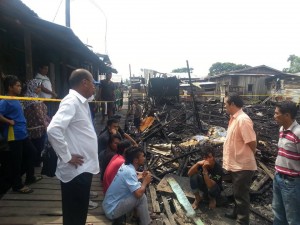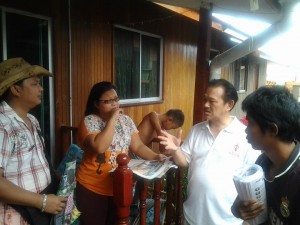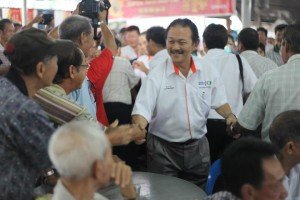Sandakan native and its MP Stephen Wong sketches some of the issues besetting Sandakan and Sabah and what the authorities need to address to revive this formerly richest city in the world and also for Sabah.
Lost glory
“I have been staying in Sandakan almost all my life. Sandakan was once an affluent city; now it is a pale shadow of its former glory. Many of the young have left the city for greener pastures in Peninsular Malaysia and overseas. There are not much good and lucrative job opportunities for them here,” Stephen laments.
A policy that was initially launched in Lahad Datu in 2005 and later in Sandakan to develop Sabah’s abundant palm oil resources, the much touted Palm Oil Industrial Cluster (POIC) initiative has been no more than an empty shell.
Stephen said that due to bad policy and implementation, crude palm oil is still being exported from Sandakan and Sabah without downstream processing. “With downstream processing it would have added more high-paying job opportunities for the professionals and generate wealth for more people around here.”
On the receiving end
Another bane for Sabah is the cabotage issue that affects Sabah indiscriminately. “Sabahans have to fork out more for imported goods due to this arbitrary and protectionist policy. Yet our average income is lower than the Peninsular Malaysia. It doesn’t help for us to achieve high income status when Sabah is suffering disproportionately more from the inflation problem,” he points out.
Another issue that has plagued Sabah, especially in the east coast area is the power outages. “Due to bad planning and political interference, Sandakan and almost the entire east coast of Sabah has been suffering from frequent power blackouts.”
“From the information we gathered, there are no spare capacity for electricity generation for the east coast of Sabah. As the power plant can’t afford to do maintenance on the power plant, it has to run until it breaks down which will affect the area’s power supply.”
“When we queried the Sabah Electricity Sdn BHD (SESB, the power provider) on why don’t the independent power producer (IPP) build another spare unit of power generator to generate electricity, SESB says it’s the IPP’s commercial consideration to [not do so],” Stephen added.
According to PR’s 2013 Budget manifesto for Sabah, it suffers the highest incidence of electricity supply disruptions, averaging around 700 minutes per customer in 2010, nearly 10 times higher than Peninsular Malaysia.
“For the POIC to succeed, Sabah needs regular and reliable electricity supply. Ministers have come and gone, yet the problem remains unresolved. I will be raising this issue constantly in order to remind the government to uphold its duty to provide good infrastructure for Sabah.”
Sabah has also being affected by shortage of diesel supply for years, and now in the last few months it has become more acute. “Off and on those who want to buy diesel will be subjected to rationing for each filling. Many lorry and truck drivers have been complaining about the rationing as they can’t travel far with limited amount of diesel in the tank.”
“There’s something fishy going on, as the companies tasked to distribute the diesel in Sabah aren’t delivering the diesel in adequate quantities to the rural areas, despite there being no known shortages of diesel refining,” he said.
 PATI problem
PATI problem
Another issue that riles Stephen is the uncontrolled influx of the illegal immigrants (PATI). “The government has been allowing the immigrants to enter Sabah without control.”
“As a result of the massive number of illegal immigrants, many of the locals’ rights and privileges have been eroded. Related to that is also the rising crime rate. Sabah needs a strong voice to force the government to act on resolving the PATI issue.”
“The ongoing RCI on the illegal immigrant problem is revealing a lot of issues that the government needs to tackle. Many of us are aware that they were entering unrestrictedly in order to allow certain political parties to benefit during the general elections.”
“Yet after the elections they are conveniently forgotten and abandoned without any assistance. They are humans too; we need a humane solution for them.”
Silver lining
After a hiatus of 27 years DAP has returned to represent the Sandakan parliamentary seat once more. However for Stephen Wong, DAP’s victory in Sandakan has been bittersweet.
“I am elated to have won the Sandakan parliamentary seat which DAP last won in 1986. However the good news was tempered by PR’s bad performance in the east coast of Sabah where we lost all but one state seat. There is a lot more work to be done to bridge the gap with the reticent electorate,” Stephen explains.
Did the Suluk terrorist invasion of Tanduo in February 2013 had an effect on the voter’s choice? “Before the GE there were many talks that the invasion would influence Muslim bumiputeras’s voting direction. “
“However it was just mere talks; the free flow of money politics by certain parties at the last few days of campaigning swayed many voters’ decision. Some of our own supporters reported that money was offered to them on the night eve of the elections.”
 Challenges for the Bumiputera support
Challenges for the Bumiputera support
DAP’s constant challenge of winning the bumiputera support has continued its stubborn streak here in Sabah. “There is no doubt that BN’s tactic of racial mongering had its effect on the people’s perception towards DAP. This perception did hinder our campaigning outreach efforts in the Muslim areas.”
“In the three state seats of Elopura, Tanjung Papat and Karamunting (located in the Sandakan and neighbouring Batu Sapi parliamentary seats) which DAP contested, we obtained slightly below 20 percent of the Muslim bumiputera support, which was below our target of 30 percent. In Elopura, we were affected by three corner fights. Overall it is still a challenge for DAP to breakthrough in the bumiputera community,” Stephen added.
However, there has been a silver lining since the GE. “Several influential figures in the Muslim community were impressed with DAP’s sincerity and effort to reach out to the bumiputera community. They have joined us after the GE. We have already formed two bumiputera majority branches in Kg Sim-Sim and Tanjung Papat.”
“After the GE, we see more Muslims coming to our service centre to ask for assistance to their problems. In the past, the bumiputeras were apprehensive about approaching us due to the BN’s propaganda. We were dependent on our coalition partners to connect with the bumiputera community.”
Hopefully with more concerted service and outreach efforts to connect with the community, DAP will do better in the next GE with the Bumiputeras.
With this opening Stephen said that DAP is looking to organise more political education sessions and serving the bumiputera community in a sustained basis. The recruitment of many bumiputera members has certainly helped the cause.
“However it’s not numbers we are concerned with; we are looking at recruiting dedicated Bumiputera members, even though few in numbers, who are willing to engage their community in a more consistent and focused manner.”
Sandakan DAP has lined up some bumiputera-specific programs. “We are looking at involved setting up a madrassah in the Sandakan area. We hope this is one concrete step for DAP to move forward in strengthening its multi-racial appeal and all-Malaysian creed.”




